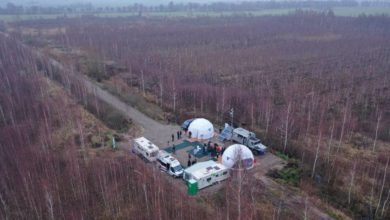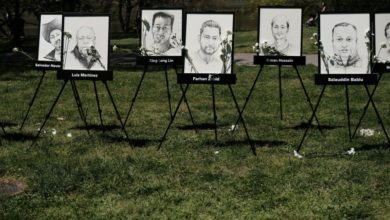Putin Puts Russia’s Nuclear Forces on High Alert

KYIV, Ukraine — In a dramatic escalation of East-West tensions over Russia’s invasion of Ukraine, President Vladimir Putin ordered Russian nuclear forces put on high alert Sunday in response to what he called “aggressive statements” by leading NATO powers.
The order means Putin wants Russia’s nuclear weapons prepared for increased readiness to launch and raises the threat that Moscow’s invasion of Ukraine and the West’s response to it could boil over into nuclear warfare.
Amid the worrying development, the office of Ukraine’s president said a delegation would meet with Russian officials as Moscow’s troops drew closer to Kyiv.
[time-brightcove not-tgx=”true”]
Putin gave the directive for nuclear alert. He cited both the statements of NATO members and the harsh financial sanctions against Russia imposed by Western countries, even the Russian leader.
Speaking at a meeting with his top officials, Putin told his defense minister and the chief of the military’s General Staff to put the nuclear deterrent forces in a “special regime of combat duty.”
“Western countries aren’t only taking unfriendly actions against our country in the economic sphere, but top officials from leading NATO members made aggressive statements regarding our country,” Putin said in televised comments.
White House press secretary Jen Psaki said Putin was resorting to a pattern he used in the weeks before launching the invasion of Ukraine, “which is to manufacture threats that don’t exist in order to justify further aggression. It is important that the international community and American citizens see it from this perspective. We’ve seen him do this time and time again.”
She told ABC’s “This Week” that Russia has not been under threat from NATO or Ukraine.
“This is all a pattern from President Putin and we’re going to stand up … ,we have the ability to defend ourselves but we also need to call out what we’re seeing here,” Psaki said.
Putin threatened in the days before Russia’s invasion to retaliate harshly against any nations that intervened directly in the conflict in Ukraine, and he specifically raised the specter of his country’s status as a nuclear power.
The U.S. ambassador at the United Nations, John F. Kennedy, responded to news coming from Moscow on a Sunday morning news show.
“President Putin is continuing to escalate this war in a manner that is totally unacceptable,” Ambassador Linda Thomas-Greenfield said. “And we have to continue to condemn his actions in the most strong, strongest possible way.”
The practical meaning of Putin’s order was not immediately clear. Russia and America typically keep the submarine- and land-based parts of their nuclear strategic forces ready for battle at all times. However, nuclear-capable aircraft and other aircraft are not.
Hans Kristensen, an analyst from the Federation of American Scientists, said that Putin might be arming his nuclear-combat readiness bombers and ordering additional ballistic missile submarines into the ocean. The United States could feel the need to respond. He said that this would be a worrying escalation, and could lead to a crisis.
The alarming step came as street fighting broke out in Ukraine’s second-largest city and Russian troops squeezed strategic ports in the country’s south, advances that appeared to mark a new phase of Russia’s invasion following a wave of attacks on airfields and fuel facilities elsewhere in the country.
Around the same time as Putin’s nuclear move, Ukrainian President Volodymyr Zelenskyy’s office said on the Telegram messaging app that the two sides would meet at an unspecified location on the Belarusian border. It did not specify a time or place for the meeting.
This announcement was made hours after Russia had announced its delegation to Belarus in order to attend talks. Initial Ukrainian officials rejected this move and said that any negotiations should be held somewhere other than Belarus where Russia has a substantial contingent of troops. Russian troops were able to enter Ukraine from Belarus.
After huge explosions in the sky on Sunday morning, Kyiv was quiet. Authorities also reported that there had been blasts at an airport. As a 39-hour curfew was in effect, only a few cars made it onto the main streets. In fear of an imminent Russian invasion, terrified residents hid in underground garages, subway stations and homes.
“The past night was tough – more shelling, more bombing of residential areas and civilian infrastructure,” Zelenskyy said.
Until Sunday, Russia’s troops had remained on the outskirts of Kharkiv, a city of 1.4 million about 20 kilometers (12.4 miles) south of the border with Russia, while other forces rolled past to press the offensive deeper into Ukraine.
On Ukrainian media and social networking sites, videos showed Russian vehicles traversing Kharkiv while troops from Russia were scattered around the city. One of the videos showed Ukrainian troops shooting at Russian soldiers and damaging light utility vehicles from Russia.
The images underscored the determined resistance Russian troops face while attempting to enter Ukraine’s bigger cities. Ukrainians have offered their help to protect Kyiv’s capital and to take guns provided by authorities.
Ukraine’s government also is releasing prisoners with military experience who want to fight for the country, a prosecutor’s office official, Andriy Sinyuk, told the Hromadske TV channel Sunday. Andriy Sinyuk did not say whether this move would apply to inmates convicted at all levels.
Putin hasn’t disclosed his ultimate plans, but Western officials believe he is determined to overthrow Ukraine’s government and replace it with a regime of his own, redrawing the map of Europe and reviving Moscow’s Cold War-era influence.
The pressure on strategic ports in the south of Ukraine appeared aimed at seizing control of the country’s coastline stretching from the border with Romania in the west to the border with Russia in the east. Major General Igor Konashenkov of the Russian Defense Ministry stated that Russian forces have blocked Kherson, on the Black Sea, and Berdyansk, on the Azov Sea.
He claimed that the Russian forces had also taken control of the airbase close to Kherson as well as the Azov Sea town of Henichesk. Ukrainian officials also reported reports of fighting in Odesa and Mykolaiv, as well as other locations.
Cutting Ukraine’s access to its sea ports would deal a major blow to the country’s economy. Moscow could also use it to create a land corridor from Crimea to Russia, an area Moscow annexed to in 2014. Until now, Russia was linked to Ukraine by a bridge that spans 19 kilometers (12 miles), the longest bridge in Europe, which was opened in 2018.
According to the mayor, flames rose from an oil depot close to Vasylkiv’s air base. This is a 37-kilometer (23 mile) city that has seen intense fighting. Russian forces blew up a gas pipeline in Kharkiv, prompting the government to warn people to cover their windows with damp cloth or gauze as protection from smoke, the president’s office said.
Ukrainian deputy commander Lieutenant-General Yevhen Moisiuk made defiant remarks in a message addressed to Russian troops
“Unload your weapons, raise your hands so that our servicemen and civilians can understand that you have heard us. This is your ticket home,” Moisiuk said in a Facebook video.
The number of casualties so far from Europe’s largest land conflict since World War II remains unclear amid the fog of combat.
Ukraine’s health minister reported Saturday that 198 people, including three children, had been killed and more than 1,000 others wounded. The exact number of civilian and military casualties was not known. Russia has yet to release information about casualties.
Ukraine’s U.N. ambassador, Sergiy Kyslytsya, tweeted Saturday that Ukraine appealed to the International Committee of the Red Cross “to facilitate repatriation of thousands of bodies of Russian soldiers.” An accompanying chart claimed 3,500 Russian troops have been killed.
Laetitia Courtois, ICRC’s permanent observer to the U.N., told The Associated Press that the situation in Ukraine was “a limitation for our teams on the ground” and “we therefore cannot confirm numbers or other details.”
The United Nations’ refugee agency said Sunday that about 368,000 Ukrainians have arrived in neighboring countries since the invasion started Thursday. According to U.N. estimates, the conflict could result in as many 4 million refugees depending on how long it lasts.
Zelenskyy denounced Russia’s offensive as “state terrorism.” He said the attacks on Ukrainian cities should be investigated by an international war crimes tribunal and cost Russia its place as one of the five permanent members of the United Nations Security Council.
Russia continues its offensive. As the West works to provide weapons and ammunition to the Ukrainian outnumbered forces, it is also punishing Russia using severe sanctions to isolate Moscow.
U.S. promised an additional $350million in military aid to Ukraine. This included anti-tank weapons and body armor, small arms, as well as other assistance such as missiles, combatants, and support for the defense of civilians. Germany promised to send missiles, anti-tank weapons and airspace closures to Russian planes to help the country under siege.
The U.S., European Union and United Kingdom agreed to block “selected” Russian banks from the SWIFT global financial messaging system, which moves money around more than 11,000 banks and other financial institutions worldwide, part of a new round of sanctions aiming to impose a severe cost on Moscow for the invasion. They also agreed to impose ”restrictive measures” on Russia’s central bank.
Responding to a request from Ukraine’s minister of digital transformation, tech billionaire Elon Musk said on Twitter that his satellite-based internet system Starlink was now active in Ukraine and that there were “more terminals en route.”
German Chancellor Olaf Scholz said that Sunday his country would commit 100 billion euro ($112.7 billion), to a special account for its armed forces. It will also increase defense spending by more than 2%. Scholz told a special session of the Bundestag the investment was needed “to protect our freedom and our democracy.”
Putin sent troops into Ukraine after denying for weeks that he intended to do so, all the while building up a force of almost 200,000 troops along the countries’ borders. He claims the West has failed to take seriously Russia’s security concerns about NATO, the Western military alliance that Ukraine aspires to join. But he has also expressed scorn about Ukraine’s right to exist as an independent state.
Russia says its attack on Ukraine targets only military targets. However, bridges and schools have been damaged.
Ukraine’s ambassador to the U.S., Oksana Markarova, said Ukraine was gathering evidence of shelling of residential areas, kindergartens and hospitals to submit to an international war crimes court in The Hague as possible crimes against humanity. The International Criminal Court’s prosecutor has said he is monitoring the conflictclosely.
British Foreign Secretary Liz Truss warned Sunday that Putin could use “the most unsavory means,” including banned chemical or biological weapons, to defeat Ukraine.
“I urge the Russians not to escalate this conflict, but we do need to be prepared for Russia to seek to use even worse weapons,” Truss told Sky News.
___
Isachenkov was reporting from Moscow and Miller, from Washington. Francesca Ebel in Kyiv and Josef Federman in Washington; Mstyslav Chenov and Nic Dumitrache, both in Mariupol in Ukraine; as well as other AP journalists worldwide, contributed to the report.
__
Follow the AP’s coverage of the Ukraine crisis at https://apnews.com/hub/russia-ukraine





